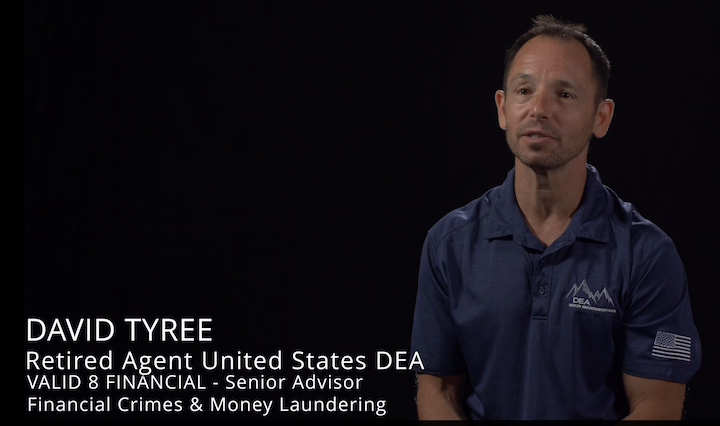The Evidence Ledger
Cash Without the Paper Trail: How P2P Payments Are Reshaping Criminal Investigations

As digital payment platforms like Venmo, Zelle, and Cash App become embedded in everyday life, they’ve also become tools for criminal transactions. Sometimes the platforms are used to move illicit proceeds—laundering drug money or concealing profits from illegal operations. Other times, they’re used directly to pay for illicit goods and services, including drugs, prostitution, and human trafficking. For law enforcement, these peer-to-peer (P2P) transactions can be both a blind spot and an investigative goldmine—if you know how to follow the trail.
We sat down with David Tyree, former federal agent and currently a Senior Advisor at Valid8, to talk about how investigators can build cases that start with a peer-to-peer payment transfer, what red flags to watch for, and why understanding money movement is no longer optional in modern criminal investigations.
Valid8: To start, how do you define peer-to-peer platforms, and how are they being used in criminal activity today?
David Tyree:
Peer-to-peer platforms are services like Venmo, Zelle, PayPal, and even things like the Starbucks app—any platform that lets you move money directly from one person to another, usually from a bank-linked digital wallet. Criminals have figured out how to exploit these tools to avoid the risks of transporting physical cash. In drug trafficking, for instance, you used to have to drive bulk cash from Montana to Denver, for example, to restock supply. Now you can just Venmo the money, break it into smaller transactions, and mask the payment with a note like “couch” or “Airbnb.” It’s cleaner, faster, and far less likely to raise a red flag.
Valid8: What makes P2P platforms especially attractive to criminals?
Tyree:
They’re fast, relatively anonymous, and under the radar. Most platforms do require basic KYC—Know Your Customer—info, but the verification can be pretty lax. Add in prepaid gift cards, social media, and the ability to transfer funds through other apps like Instagram or Snapchat, and you’ve got a perfect storm. I’ve literally seen drug payments disguised as likes or hearts on a TikTok dance video.
Valid8: What are some of the red flags investigators should look for when reviewing P2P activity?
Tyree:
You have to study what’s normal before you can spot what’s abnormal. That’s my biggest piece of advice.
Red flags include round-numbered transfers—$500, $2,000—especially if they’re frequent and don’t align with someone’s lifestyle or income. If you’re looking at someone who works in a coffee shop and you see $3,000 transfers in and out in short succession, that’s a clue. Also, look at the memo lines. People don’t usually write “drugs,” but they’ll put in something vague or jokey to avoid detection.
Valid8: So, if someone’s Venmo activity exceeds their known income or lifestyle, that’s a warning sign?
Tyree:
Absolutely. That’s what I call the most basic level of financial investigative training: when the money movement exceeds the reported income, something’s off. It could be tax evasion, human trafficking, drug sales—you name it. It’s always about painting the full picture.
Money in, money out. When that picture stops making sense, that’s when you dig deeper.
Valid8: You gave an example of drug payments disguised as likes or hearts on a TikTok dance video—can you walk us through that scenario?
Tyree:
Sure. Imagine we set up a fake fitness business—David’s Booty Boot Camp. We create marketing materials, open an LLC, and set up a business bank account. We post workouts on TikTok, and then we tell our “clients” to send us money using Venmo or TikTok Gifts. In reality, it’s drug money being funneled into the account. We’ve just given it a fake story. And if we ever got questioned, we’ve got fake invoices and marketing to back it up. That’s trade-based money laundering, and it’s incredibly common.
Valid8: How do these platforms complicate evidence collection?
Tyree:
Honestly, it’s not that they’re more complicated—it’s that everything is complicated now. Investigators understandably get overwhelmed fast. They’re handed 800 pages of bank records and don’t know where to start. But with P2P, you also have to act fast. These platforms don’t retain data forever. That’s why it’s critical to send a preservation letter right away to freeze the data until you can subpoena it.
Valid8: What are some common misconceptions investigators have when it comes to P2P payments?
Tyree:
A big one is thinking, “It’s just Venmo, it won’t help.” That’s dead wrong. These platforms often have law enforcement portals and teams ready to support investigations. Snapchat, for example, has an incredibly helpful liaison unit. You just have to know how to engage them—and that starts with understanding how their systems work.
Valid8: And that ties into training, right? Are agencies doing enough to keep up?
Tyree:
Training is slow. I always tell investigators: if you’re investigating crypto, download a wallet. If you’re investigating Venmo, set up an account and send some money. See how it works. The more familiar you are with the platform, the better questions you’ll ask—and the more effective your subpoenas will be.
Valid8: So where does Valid8 fit into this process?
Tyree:
Once you’ve subpoenaed the platform and the bank tied to the transaction, you’re going to get back the payment data in the form of PDFs, spreadsheets, images—it’s a mess. Valid8 helps make sense of that mess. It organizes the records, shows you where the money came from, where it went, and when it moved. It builds a visual storyboard of financial activity that investigators can use to brief supervisors, prosecutors, even juries. Instead of spending hours trying to line up Excel columns, you’re looking at a clean timeline of transactions with links back to the source documents.
Valid8: What would you say to agencies that are still ignoring this kind of financial activity?
Tyree:
Then you’re not thinking like a criminal—and that’s a problem. This is no longer a fringe issue. P2P payments are everywhere, and bad actors know how to use them. If you’re not including them in your investigations, you’re missing a huge part of the picture.
These aren’t mysteries—they’re puzzles. And the money is one of the biggest pieces.
Valid8: Any final takeaways for investigators?
Tyree:
Yes: build the relationships early. These platforms all have people dedicated to helping law enforcement. Treat them with respect, learn how they operate, and don’t wait until the clock’s running out on your case. Also — ask better questions. The clues are there. If the story the money tells doesn’t line up with the life the person is living, something’s wrong.
One of the things I always emphasize in training is that law enforcement doesn’t need to reinvent the wheel — there are tools out there to make this easier. I actually compiled a free resource that lists out the major peer-to-peer platforms, their subpoena portals, and some tactical steps investigators can take once they identify a P2P service on a suspect’s device. It includes links, law enforcement contact info, and guidance on using BIN checks to trace funding sources. If you’re serious about pursuing these cases, this kind of cheat sheet can save you hours.
Want to go deeper?
Whether you’re tracing peer-to-peer payments, building a timeline of transactions, or preparing evidence for prosecution, Valid8 gives you the clarity and control to move faster and uncover more. Contact us to learn more about how Valid8 can support your investigations.
About David Tyree
David Tyree is a former federal agent with more than two decades of experience investigating financial crimes, narcotics trafficking, and money laundering operations across multiple agencies. As a Senior Advisor at Valid8, he draws on his frontline expertise to help law enforcement, prosecutors, and forensic accountants use financial data more effectively to build stronger cases.



















